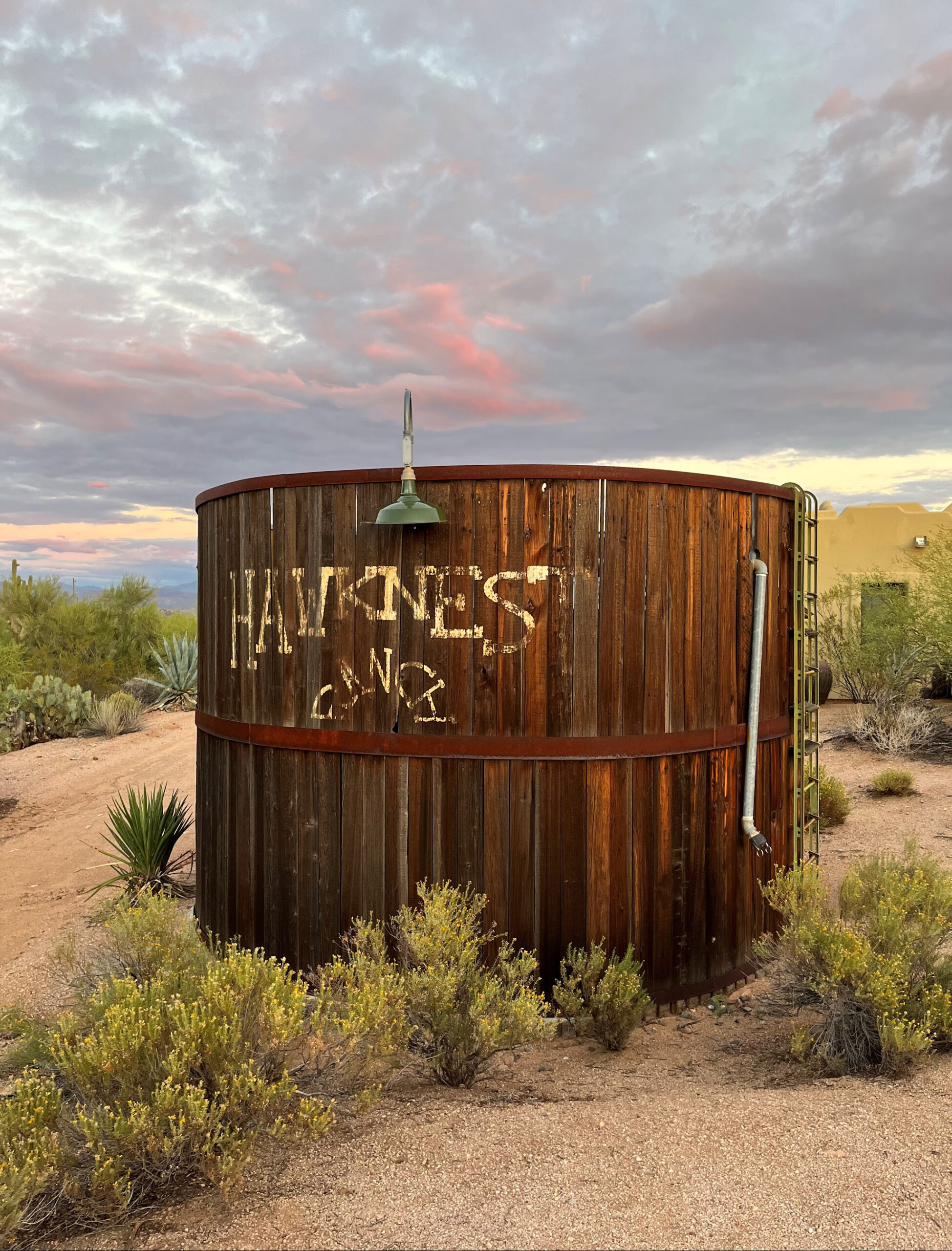By Meredith DeAngelis, Rio Verde Foothills Standpipe District Board Chair
Over 13 years ago, my husband and I decided to search for the perfect home in which to settle down. We found the Rio Verde Foothills to be exactly what we were looking for — a unique desert community with custom homes, large lots, dark skies, and nearly endless trails for running and mountain biking.
The home we fell in love with was on a dirt road where more modern utilities tend to be somewhat limited. Fresh water for the property was hauled in and wastewater was processed through a septic system. After doing some research, we learned this was considered typical for the area, and we took the leap.
Our home is connected to a 5,000 gallon above-ground water tank. Once the water in our tank gets low, our commercial water hauler gets a notification and brings us a delivery of water. As years went by, this seemed totally normal and was our way of life.
A few years ago, we started to hear community chatter about the drought and the possibility that our water source was at risk since we live outside city limits that make up an unincorporated part of Maricopa County. We were advised by our trusted water hauler company to consider signing a petition to be part of a Domestic Water Improvement District (DWID) — and that’s when everything changed.
The Rio Verde Foothills consists of approximately 2,100 houses, with an estimated 750 homes dependent on hauled water. Towards the end of 2021, a press release from the city announced that our community had until December 31, 2022, to secure our own water solution. Our community quickly became divided on how to solve the problem.
I attended community meetings, reached out to the press, and contacted politicians. I shared our story with anyone who would listen in hopes of finding a permanent solution to our community’s water crisis. I was hopeful that as soon as the story got out, our problem would be quickly resolved. Unfortunately, that wasn’t the case.
After failed attempts to get a DWID established, our community entered 2023 with no secure, affordable water solution. Water haulers serving the area had to increase their travel time to find available water for sale, thus increasing the cost of water to their customers.
The residents using hauled water went into conservation mode as the cost of water increased and the uncertainty of water deliveries became a reality. Most people use approximately 100 gallons of water a day. For my family, that would be 9,000 gallons a month. To conserve our resources, we drastically cut our water usage to between 2,000 and 3,800 gallons a month.
We embraced our natural desert surroundings and stopped watering outdoor plants, resulting in significantly less water usage and an environment that is more easily maintained and less wasteful. Although we have water-efficient appliances, we cut down on time in the shower and even moved to flushing toilets less. Water is a precious resource, and our family will keep these conservation efforts in place and hope others will do the same.
 As the stress levels in the community increased, we continued to share our story and worked tirelessly to find a secure and affordable water source for our homes. The first attempt at a solution required significant government involvement to get a bipartisan bill passed to allow the community to use a nearby standpipe temporarily. The bill, known as SB1432, required the appointment of five board members from Rio Verde Foothills who would work to secure a temporary third-party water solution, oversee billing, and regulate rates for participating Rio Verde Foothills homes. A long-term solution would be overseen by the Arizona Corporation Commission.
As the stress levels in the community increased, we continued to share our story and worked tirelessly to find a secure and affordable water source for our homes. The first attempt at a solution required significant government involvement to get a bipartisan bill passed to allow the community to use a nearby standpipe temporarily. The bill, known as SB1432, required the appointment of five board members from Rio Verde Foothills who would work to secure a temporary third-party water solution, oversee billing, and regulate rates for participating Rio Verde Foothills homes. A long-term solution would be overseen by the Arizona Corporation Commission.
Members of the community applied and went through an interview process. I was appointed by Governor Hobbs, and my peers were appointed by different areas of the government. Shortly thereafter, we took our oath of office and became a government entity.
The board went through open meeting law training; interviewed and secured legal counsel; and began having open meetings and researching solutions. The pressure to resolve the water crisis quickly was high, and the community was eager for a solution, even if it were temporary. After months of working with the city, several government officials, and a private water company called EPCOR, we finally had a solution. The board secured water from EPCOR and worked with the City of Scottsdale to treat and transfer the water so that the haulers could once again have a nearby, reliable source of water.
Once a long-term solution is established with EPCOR and the Arizona Corporation Commission, the Rio Verde Foothills Standpipe Board will dissolve. Between now and then, the board will continue to oversee the short-term solution and keep the community informed of the key milestones taking place for implementation of a long-term solution.
Looking back to the beginning of this crisis, I never thought it would have taken this long or been this hard to reach a final solution. It required years of volunteer work from so many, in addition to pushes from the media, a wealth of political involvement, and so much more to make it to where we are today. I can only hope that the lessons our community learned can be seen and heard by others so that no community must experience hardship like this again.
 Several people have asked me if I regret purchasing my home after all we’ve gone through. As crazy as it may sound, I would do it all over again, with conservation in mind. I cherish my home — the beautiful natural desert that envelops my community, with its dark skies and amazing views. Arizona is my home, and I believe we can make a difference by making small changes to preserve the resources that are naturally limited in our desert surroundings.
Several people have asked me if I regret purchasing my home after all we’ve gone through. As crazy as it may sound, I would do it all over again, with conservation in mind. I cherish my home — the beautiful natural desert that envelops my community, with its dark skies and amazing views. Arizona is my home, and I believe we can make a difference by making small changes to preserve the resources that are naturally limited in our desert surroundings.






